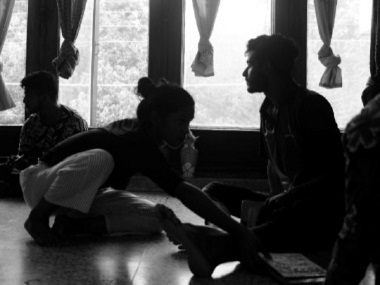Rihla, in Arabic, means travelogue or a written account of travel. A play called Rihla must therefore be about travellers or the account of one or many such journeys. It is, however, both and neither, to an extent. Rihla’s beginning implies the onset of a journey that rather naturally, and a bit farcically returns to its starting point. Adapted from the Greek play I Want a Country by playwright Andreas Flourakis and directed by Neel Chaudhuri, the play brings together a cast of 11 actors represented by the Aagaaz Trust; they play characters who decide to leave their country in search for another. The point, much of it at least, is to question what shape must that prospective, vague nation take. In an era where the young and restless of the world are increasingly becoming disillusioned with the idea of nationhood, Rihla offers a valid, if concerning point to start a discussion. Are we the answer or are we, unintentionally, the eternal question? Rihla is performed by 11 actors, whose movements on the floor of performance is largely cyclical, often giving the impression of a narrative intentionally circling a core quandary. There are no characters per se; no backstories, or vignettes that classify these actors into anything other than dishevelled archetypes — there is the aspiring author, the nihilist, the rebel, the pious young man and so on. “I think in theatre it is far more critical what you can say with movement on the floor itself, rather than going into histories or background information of characters. Especially in this format, where the narration is a sort of Greek-style chorus. It was, of course, challenging to adapt what were close to 800 lines of dialogue, which is why we developed archetypes, to flesh out that relationship between the country and the individual,” Chaudhuri says. For a play that is a somewhat dreamy discussion about everyone’s idea of a nation, Rihla can after a point, seem redundant. That is not, however, an unintended consequence, it is a carefully orchestrated reflection of the shape contemporary discussion on politics and identity have taken. Nothing is the same every day.
“We have prepared for the play by asking the actors about their own ideas for their country. Theirs is a bigger stake in the future, and their answers, their thoughts help us decide who will take on what role. It is a conversational, organic process. There are of course similarities when a person naturally chooses to play someone that represents him or her. But the greater fun is in doing roles that are not you,” Chaudhuri says. Much of Rihla, though concerned with a weighty, solemn quest, is light in its language. “We wanted to make sure we weren’t wordy. It is a play about young people after all, and we don’t want to commit things to memory, but rather invite people to think and question,” Chaudhuri explains. Rihla’s choreography, though largely straightforward and rigid is perhaps indicative of the echo chambers of social media. The limited movement Chaudhuri says has been one of the challenges. “I know this wouldn’t be a bestseller nor were we at any point thinking of making one. A lot of people might want more in the movement, or are used to a certain kind of theatre, but here we wanted to just begin a discussion,” he says. The group of protagonists, for the sake of symbolism, carry and manipulate baggage. No two types of baggage are the same, neither is preference for the type of country each wishes they are headed to. Rihla is, perhaps in essence, a conversation between individuals that turns discourse into kinetic masses colliding with each other. Coincidentally, all want the same thing, but can’t help but look at it in different ways. The Aagaaz trust has been working with young aspiring actors from the Nizammudin basti for some years now. Their exuberant energy, the elegance of youth is on display in a play that can after an hour or so make one restless, perhaps akin to social media that goes nowhere without accommodation of one or the other. “That has been one of the challenges. We didn’t want to make statements in the adaptation nor did we want to overly compensate for philosophy, ideology etc. It is hard to make these choices, encapsulate so much and still turn out a play that must also entertain,” Chaudhuri says. Rihla’s sound design is exemplary. Its conversations can get lost in the woods, and so can the faces, the actors and their own preferences. Towards the end, it begins to dawn on the audience that our group of protagonists never perhaps left the shore. Their self-discoveries will lead them up the same old bark, the same old tree, only they need to see it for itself for once. Disagreements are inevitable, and understanding the fact that contradiction and conflict are inescapable is part of that discovery. No nation is a monologue. It is a conversation. Most dialogues in Rihla begin with the words ‘Main aisa desh chahta hun…’. Even days after watching the show I am yet to convince myself I know the end to that sentence.
In an era where the young and restless of the world are increasingly becoming disillusioned with the idea of nationhood, Rihla offers a valid, if concerning point to start a discussion. Are we the answer or are we, unintentionally, the eternal question?
Advertisement
End of Article


)
)
)
)
)
)
)
)
)



